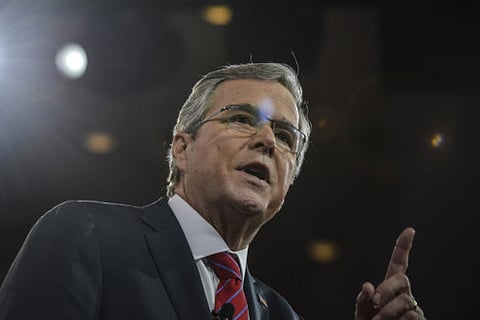‘Bush’ is overwhelming ‘Jeb’ right now
Jeb Bush is this year’s political fresh face

It is going to take a lot of money to convince Republican voters that they do not know Jeb Bush. The notion that Bush is a tired old warhorse, familiar to all and distasteful to many, is the flip side of his singular political advantage in the Republican field — the family connections, the vast and hyper-wealthy donor network, the ready access to political and policy expertise.
In reality, voters cannot possibly know that much about Bush. He was a successful — and conservative — governor of Florida, but he has not been in office since 2007. His (yet to be announced) presidential campaign, along with an outline of his views on immigration and Common Core, have generated news in recent months. But he has never run for president or served in a cabinet. He has never been a national political figure; even during his brother’s presidency, he did not have an especially high profile.
The disastrous effects of that presidency, however, seem to have such resonance that voters intuitively recoil at Jeb’s surname. In January, pollster Peter Hart gave a list of politicians to a dozen Colorado residents and asked whom they would least like to have as a next-door neighbour. Among the 12 people — Democrats, Republicans and independents — eight named Jeb Bush. Unless random Coloradans spend an inordinate amount of time studying Florida politics, that is a testament to how powerfully “Bush” is overwhelming “Jeb” right now.
Dynastic drag is prevalent in both political parties. But it afflicts Bush more than Hillary Clinton — even though it is Hillary, not Bush, who has been a high-profile fixture of national politics for almost a quarter century. Hillary is much more popular with Democrats than Bush is with Republicans and she consistently leads Bush — sometimes by double-digits — in general election match-ups.
“If Republicans are going to win the election in the fall of 2016, we need a new fresh face, big bold ideas from outside of Washington, and someone who’s got the proven track record,” Wisconsin Governor Scott Walker told Adam Smith of the Tampa Bay Times.
Walker probably had many Republicans at “fresh face”.
This is where money comes in. Bush is expected to have quite a lot of it. He is probably going to need it. His campaign faces a very expensive series of tasks.
First, it must disabuse Republican voters of the notion that they already know this candidate; his admakers must distinguish Bush not only from the 2016 field, but also from his brother and father. Bush is unlikely to win over hard-core conservatives in a primary. He needs to command enough voters in the Republican centre, however, that he can withstand a strong challenge from the Right. If the Right-wing settles reasonably quickly on a champion, inertia will be against Bush; he will have to jostle some voters into reconsidering settled opinions.
Second, at some point, Bush will have to vigorously defend himself. Bush’s vulnerabilities — he is too empathetic on immigration, too centralised on education and too connected to people whom many conservatives view with suspicion — fit very snugly into a coherent 30-second argument that Bush does not share conservative values.
Third, to limit the damage from such attacks, Bush must not only Hoover up as much money as possible, but also to cut the flow of cash to his rivals.
Bush is a shrewd politician and has general-election advantages, but before he can get a hearing in the broader electorate, he is going to have to convince Republican voters that they really, truly, do not know who the heck he is.
— Washington Post
Francis Wilkinson writes on politics and domestic policy for Bloomberg View.



